Most Don’t Know it Was Andrew Weissmann Who Publicly Released the Carter Page FISA Application, Even Fewer Know Why
This has been one of the odd aspects to the special counsel investigation deployed under the nameplate of Robert Mueller. However, with the trial of Hillary Clinton campaign lawyer Michael Sussmann bringing more curious minds to the backstories, here is one that few people understand.
You will remember the massive media debate in early 2018 about the FISA application deployed against former short-time Trump campaign aide Carter Page. The DOJ, at the time under the control of the Mueller special counsel for all things Trump-Russia related, wouldn’t let congress see the FISA application. Devin Nunes complained to House Speaker Paul Ryan.
Eventually a deal was struck and two members from the House Intelligence committee (democrats and republicans) and two members from the House Judiciary Committee, were allowed to go to Main Justice and read the FISA application, but not copy it. Four congressmen were allowed to go read and take notes. Trey Gowdy and John Ratcliffe represented the two republicans, and their notes formed the basis for what later was called “The Nunes Memo.”
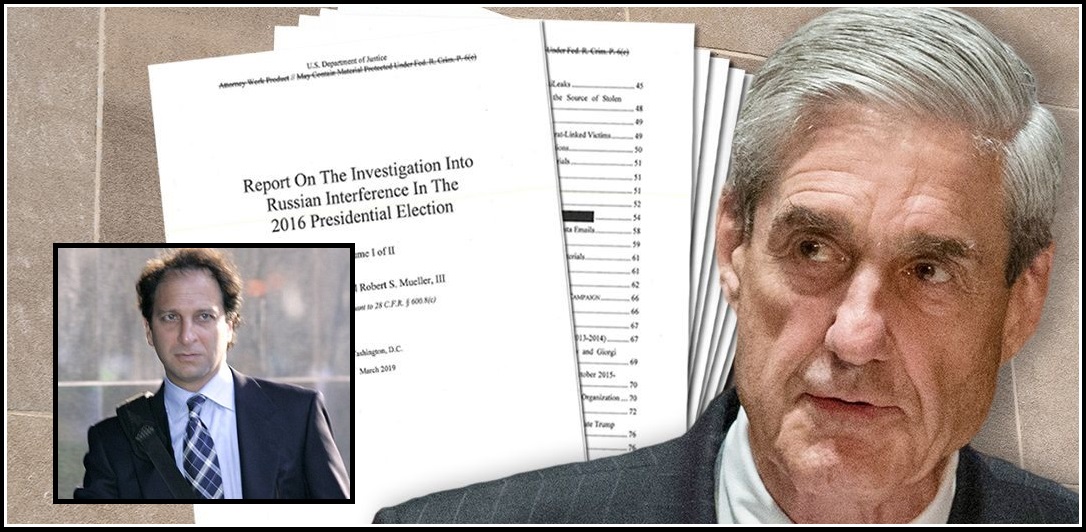
The Democrats were not happy with the claims in the Nunes memo, and subsequently HPSCI ranking member Adam Schiff wrote the democrat version.
Both of those sets of memos then needed to be declassified, more delays, before they could be made public. For weeks and weeks, the Nunes -vs- Schiff memos were debated by both sides, with each saying their version was the truth and the other party’s version was spin and/or false. All of this was happening in January, February and March 2018.
Then, later in the summer, something really weird happened. Main Justice completely reversed position on keeping the FISA application secret, and for the first time in U.S. history a top secret classified Title-1 FISA application was released to the public (with redactions).
People were so filled with curiosity about the Carter Page FISA application that few, heck, almost no one, stopped to ask why it was released? Why the sudden secrecy reversal by the DOJ?
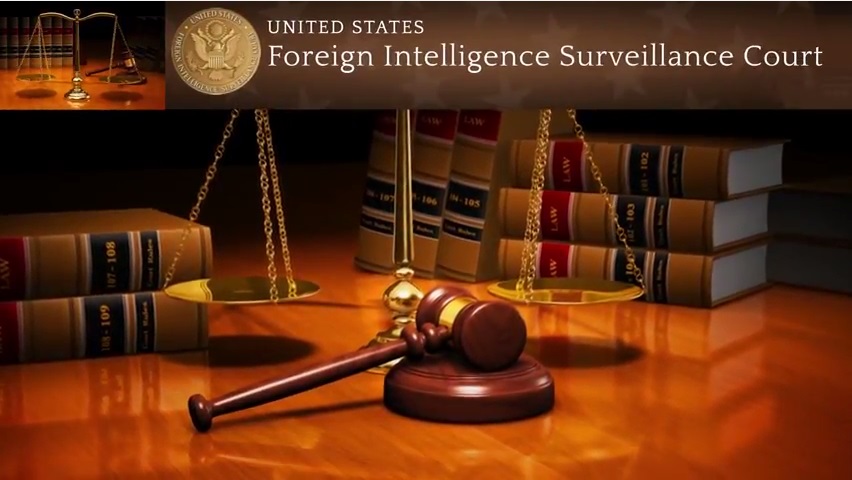 The FISA application was made public under the auspices of a Freedom of Information Act request from the media. However, if you were intellectually honest and curious that justification never made any sense. If there was ever a document easy to keep hidden from the public, a Title-1 top secret, classified, FISA application was that document. No FOIA lawsuit was ever going to penetrate that firewall, it was simply too easy for the government to keep hidden.
The FISA application was made public under the auspices of a Freedom of Information Act request from the media. However, if you were intellectually honest and curious that justification never made any sense. If there was ever a document easy to keep hidden from the public, a Title-1 top secret, classified, FISA application was that document. No FOIA lawsuit was ever going to penetrate that firewall, it was simply too easy for the government to keep hidden.
The FISA application was released over the weekend on July 21st and 22nd, 2018, a Saturday and Sunday.
Everyone quickly rushed to read the national security search warrant. Heck, no one in the public had ever seen one before. The FISA application confirmed the details of a Trump campaign official under a year of extensive surveillance and search authority; but again, few stood back and asked why it was being released. Here’s the background.
Former Deputy Attorney General Rod Rosensten gave testimony to the Senate in June of 2020 {LINK}. Within Rosenstein’s election year and little covered testimony, he revealed that Special Counsel Robert Mueller and his main deputy Andrew Weissmann were completely in charge of Main Justice at the DOJ during the time the special counsel investigation was happening. Attorney General Jeff Sessions was recused, and DAG Rosenstein was in charge of how much power and authority Mueller and Weissmann’s team held in the DOJ.
Rosenstein testified the special counsel had full control over everything and anything related to Trump-Russia, including the Carter Page FISA application the special counsel had re-submitted for the third renewal on June 29, 2017.
Anything that remotely touched the Trump-Russia investigation was completely and unilaterally controlled by Mueller and Weissmann, including any ancillary investigation that would come as an outcome from anything to do with Trump-Russia (the SSCI leak by James Wolfe is one example).
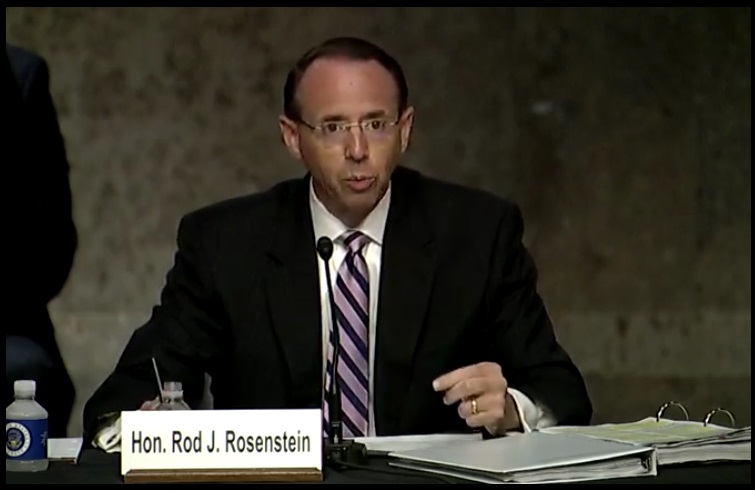 Rosenstein also testified he deferred everything to Mueller/Weissmann and never challenged any of their requests for expanded investigative scope or authority. Rosenstein felt the special counsel was in charge, and anything they wanted – they got. As Deputy AG Rosenstein said all the special counsel operations were part of their investigative authority, and he felt he had no place in questioning, challenging or refusing anything related to their investigative authority.
Rosenstein also testified he deferred everything to Mueller/Weissmann and never challenged any of their requests for expanded investigative scope or authority. Rosenstein felt the special counsel was in charge, and anything they wanted – they got. As Deputy AG Rosenstein said all the special counsel operations were part of their investigative authority, and he felt he had no place in questioning, challenging or refusing anything related to their investigative authority.
Mueller/Weissmann had full control.
That June 2020 testimony was the final piece of the puzzle as to who authorized the release of the Carter Page FISA application to the public. It was Andrew Weissmann; but why?
In the background of June and July 2018, unbeknownst to the public at the time, Inspector General Michael Horowitz had just discovered that FBI lawyer Kevin Clinesmith fabricated an email, which was used as part of the FISA application. The CIA told Clinesmith that Carter Page was working for them. Clinesmith doctored the email and told the FBI and DOJ that Carter Page was NOT working for the CIA. The exact opposite of the CIA statement to him. If the truth was known about Page working for the CIA, the DOJ would never have been able to get the second renewal of the FISA application in April 2017.
The INSD office of the Inspector General discovered the Clinesmith material lie, but at the time in June 2018 no one else knew. However, internally the Weissmann special counsel knew exactly what IG Horowitz discovered. Now they had a problem. The special counsel had renewed the application using the Clinesmith lie in June 2017.
If the search warrant application was based on fraud, the search warrant could be invalidated by the same court that authorized it. That would be a problem because the legal cases against Paul Manafort, and Michael Flynn, along with the investigations of Michael Flynn Jr., George Papadopoulos and Walid Phares were all based on evidence obtained by the fraudulently constructed search warrant.
The Weissmann special counsel had a fruit of the poisonous tree problem on their hands. When the FISA court (FISC) finds out about the results of the IG report, which will include the fabrication by Kevin Clinesmith, the FISC could revoke and invalidate the authority of the Title-1 search warrant. If the FISC did that, all of the evidence against Manafort and Flynn would disappear, and they would have to drop any investigative path that came from the exploitation of an unlawful warrant.
The search warrant was already getting massive scrutiny from congress and the public. People quickly discovered the FBI had used the Steele Dossier as the ‘Woods file’ underpinning the application. People were finding out the Steele Dossier was based on fictitious and debunked information the FBI knew about in January and February of 2017, even before the second and third renewals.
On July 12th, 2018, the Weissmann special counsel jumped into action and drafted a letter to the FISC saying despite recent information from congressional investigations, the predicate for probable cause still existed (see below). This letter was written to the FISC, filed quietly, and never shared with DAG Rosenstein or congress. It was a very big lie from the Weissmann special counsel. [NOTE, only the FISA court knew this letter existed until 2020.]
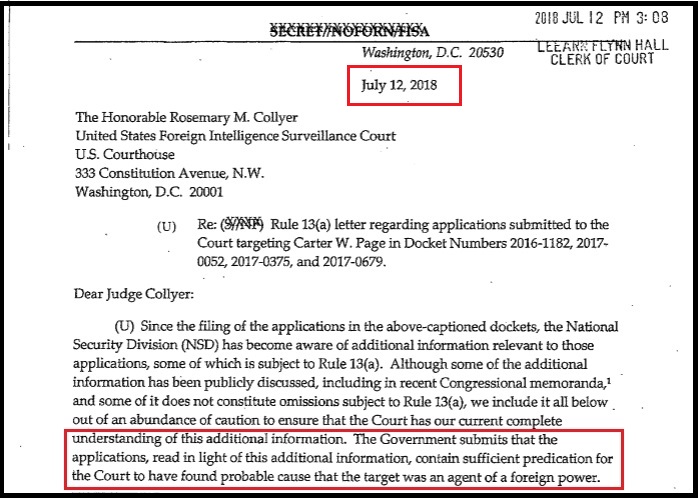
[NOTE, only the FISC knew this letter existed until 2020. When the FISC saw the IG report and the details about Kevin Clinesmith the FISC demanded the DOJ send a copy of that July 2018 letter to congress for oversight and accountability – SEE HERE] Weissmann lied to the FISC to protect his criminal cases which were at a very important stage in mid 2018. By the time the FISC found out about the Clinesmith fabrications in late 2019 it was too late. The fraudulent search warrant had been made public, the cases that used the warrant authority were over and the special counsel had concluded. The FISC demanded that congress be notified, and Bill Barr did as the FISC requested… he told congress. Congress did nothing.
However, going back to that critical time in 2018, there was also another issue surrounding the FISA application that also surfaced mid-summer providing a second reason to make the FISA application public.
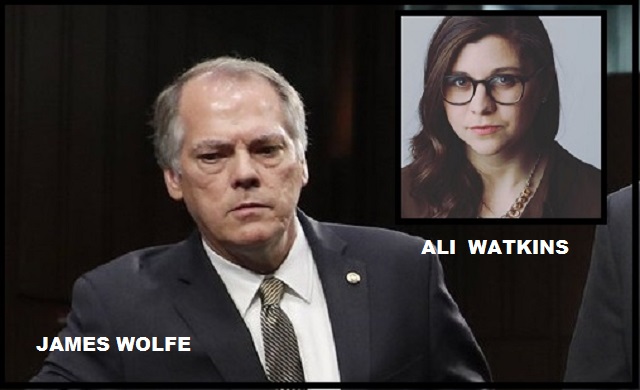 An indictment of Senate Select Committee on Intelligence (SSCI) Security Director James Wolfe was unsealed in the DC court {June 7, 2018, LINK}. James Wolfe was busted for leaking information to journalists from the Senate Intelligence Committee, one of those leaks was the Carter Page FISA application, which Wolfe leaked to Ali Watkins on March 17, 2017, a year earlier.
An indictment of Senate Select Committee on Intelligence (SSCI) Security Director James Wolfe was unsealed in the DC court {June 7, 2018, LINK}. James Wolfe was busted for leaking information to journalists from the Senate Intelligence Committee, one of those leaks was the Carter Page FISA application, which Wolfe leaked to Ali Watkins on March 17, 2017, a year earlier.
Wolfe was going to face a criminal trial for charges related to the leaking of that FISA application. Again, this was problematic for the special counsel because that leak was part of the reason why the special counsel was appointed.
On March 17, 2017, SSCI Vice-Chairman Mark Warner wanted a special counsel appointed. There was a debate about whether President Trump was under an investigation of any sort. Senator Warner’s motive for the special counsel was exactly because he knew the DC machinery needed to throw a bag over all of the corrupt targeting of Donald Trump; a special counsel could do that, and be weaponized to continue the attacks.
Senator Mark Warner told SSCI Security Director James Wolfe to leak the FISA application on March 17, 2017. Three days later, March 20, 2017, FBI Director James Comey first admitted publicly, while testifying to congress, that President Trump was under investigation since July of the previous year (2016). The timing of the two events was not accidental. Warner and Comey both wanted a special counsel investigation put into place for the same reason. Both needed a cover-up operation.
Fast forward to the end of December 2017 and James Wolfe is busted for the FISA application leak. The investigative evidence against Wolfe had to flow through the special counsel, before it could be given to a grand jury, because the special counsel had control over anything that touched Trump-Russia and that included their FISA application.
Between January and late April, the Special Counsel went to work diffusing the damage within the Wolfe evidence files (but that’s for another story). In May the now diminished evidence file was given back to the DC U.S. Attorney and a grand jury was seated May 3, 2018. The indictment was unsealed June 7th.
After lying to the FISA court about a justified predicate still existing, July 12,2018, FISA Andrew Weissmann made the FISA application public on the weekend of July 22, 2018, for two reasons:
(1) To protect the predicate of his search warrant authority; and by extension preserve the cases he created using it; and by extension avoid the fruit of the poisonous tree issue by diluting the need or the FISC to invalidate the Title-1 search warrant.
(2) To render moot and remove the most explosive element of the criminal case against James Wolfe.
It was the special counsel, specifically Andrew Weissmann, who released the FISA application to the public.
Few people knew that.
Even fewer knew why.
Now you do.
The gateway to expose the corrupt DOJ and FBI officials does not lie at the end of the path where you find Hillary Clinton, Perkins Coie, Fusion-GPS or any of their cohorts and corrupt political/media allies. Following that trail leads to obfuscation, ‘mistakes were made’ justification and institutional preservation.
Instead, the gateway to expose the corrupt DOJ and FBI officials, lies at the end of the path walked by the Mueller Weissmann special counsel.
Follow that trail and you walk right in the front doors of Main Justice and the Washington DC FBI offices.
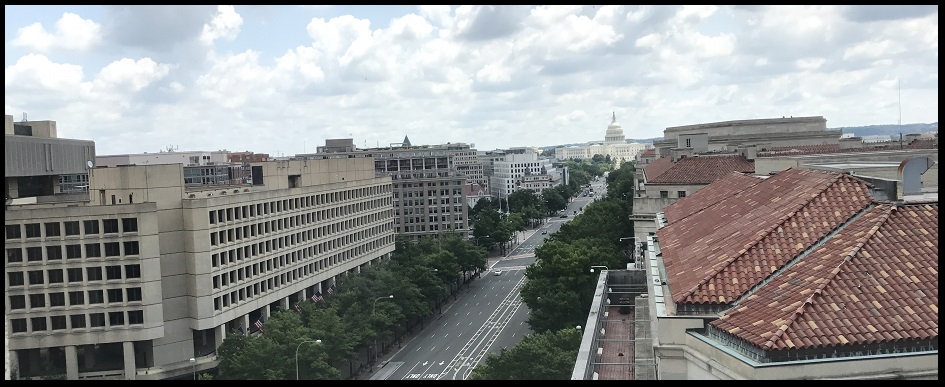




Post a Comment